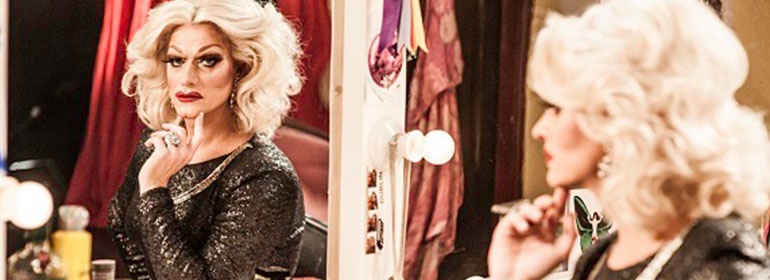The Queen of Ireland, Conor Horgan’s film following the life and times of Rory O’Neill, and his alter-ego, Panti Bliss, may struggle to find its way through Pantigate, but on the whole, it’s essential viewing, says Brogen Hayes.
Over the past number of years, Rory O’Neill (aka Panti Bliss) has become a household name in Ireland, as she campaigned for equal marriage rights, and refused to allow his views on homophobia in Ireland to be silenced. The Queen of Ireland goes deeper than the surface, however, allowing O’Neill to tell his story for the first time, and how his life has evolved, from accidentally becoming a drag queen, to that drag queen accidentally becoming an activist and ‘National F***ing Treasure’.
Conor Horgan’s film began life in 2010, and follows the charismatic and forthright O’Neill as he looks back over his life, from the first time he realised he was ‘different’ to the other children in his home town of Ballinrobe, Co.Mayo. O’Neill is candid and charming in his recollections, giving the audience a peek behind the persona he has created in Panti Bliss, as well as a history of gay rights in Ireland. The first half of the film chronicles O’Neill’s time in art college, his emigration to Tokyo, where Panti was born, and his eventual return home to Ireland.
The second half turns its attentions to the Pantigate affair, culminating in Panti’s Noble Call speech at Dublin’s Peacock Theatre in February 2014. From there, the film becomes a chronicle of the campaign for Marriage Equality in Ireland, following O’Neill as he knocks on doors and shares his fears as to what a No vote would mean for Ireland as a country.
The Queen of Ireland is incredibly well constructed, allowing Irish audiences to remember the progress made in a relatively short time, and international audiences to learn more about the people behind the landmark changes made in Ireland, through the eyes of a self-aware drag queen with a barbed tongue and a wicked sense of humour. Horgan allows O’Neill to speak for himself, bringing in family and friends to give a fuller picture of both O’Neill and the challenges faced in Ireland in recent years.
That said, there are times where ‘The Queen of Ireland’ struggles to find a way around the legal issues that O’Neill faced as a result of his 2014 appearance on The Saturday Night Show, the appearance that kicked off Pantigate to begin with. Of course the filmmakers are careful not to repeat the statements that led to RTÉ paying out €80,000 to those that O’Neill named after being asked about homophobic people in the media, but in doing so, there is a slight hole in the narrative that those less familiar with the events may find confusing.
In all, however, this is an emotionally engaging, frank and charming look back over the life of one high profile gay man/drag performer in the dying days of Catholic Ireland. O’Neill is as candid and colourful as you could hope, and his triumphant return to his hometown of Ballinrobe – which forms the closing of the film – is cathartic, moving and in the end, perfect. Slight imperfections aside, The Queen of Ireland is essential viewing.
© 2015 GCN (Gay Community News). All rights reserved.

comments. Please sign in to comment.